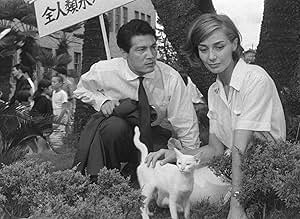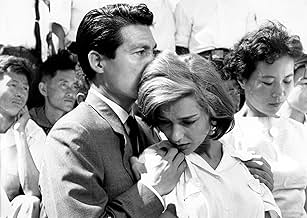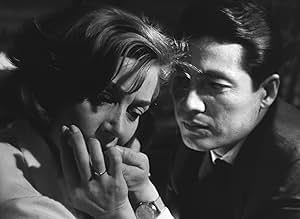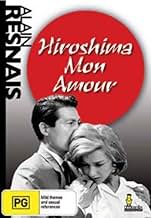AVALIAÇÃO DA IMDb
7,8/10
37 mil
SUA AVALIAÇÃO
Uma atriz francesa que está rodando um filme contra a guerra em Hiroshima tem um caso com um arquiteto japonês casado, enquanto compartilham suas diferentes perspectivas sobre a guerra.Uma atriz francesa que está rodando um filme contra a guerra em Hiroshima tem um caso com um arquiteto japonês casado, enquanto compartilham suas diferentes perspectivas sobre a guerra.Uma atriz francesa que está rodando um filme contra a guerra em Hiroshima tem um caso com um arquiteto japonês casado, enquanto compartilham suas diferentes perspectivas sobre a guerra.
- Indicado a 1 Oscar
- 7 vitórias e 7 indicações no total
Emmanuelle Riva
- Elle
- (as Emmanuele Riva)
Moira Lister
- (Dubbed Emmanuelle Riva)
- (não creditado)
Enredo
Você sabia?
- CuriosidadesThis film pioneered the use of jump cutting to and from a flashback, and of very brief flashbacks to suggest obtrusive memories.
- Erros de gravaçãoWhen Elle leaves the hotel to go the set, she is wearing a nurse's uniform with a headscarf and carrying a black handbag. When Lui meets her on the set, she is now wearing a skirt and blouse and still has the headscarf. When they leave the set, the headscarf is left behind. When they get to Lui's house, she now has a white jacket.
- ConexõesEdited into Histoire(s) du cinéma: Le contrôle de l'univers (1999)
Avaliação em destaque
Memory has persistently troubled filmmakers, this facet of consciousness by which the past overwrites the present. Where do these images come from, at what behest? More importantly, by invoking memory, how can we hope to communicate to others this past experience, which only perhaps existed once?
The woman says she saw Hiroshima, the charred asphalt and scorched metal, the matted hair coming out in tufts. We may have seen the same anonymous images of disaster, elsewhere, and think we saw. We see other people like her, like ourselves as mere spectators of a film, walk around the a-bomb museum in Hiroshima among the relics of disaster, lost in thought, impotent to reconstruct the experience from these glassed remnants of it. One of the great metaphors of memory, this museum that houses and presents fragmentary what used to be and how the spectators merely move inside it—internal observers of images.
The woman says she saw Hiroshima, but we know she didn't really experience. We know by the same images we may have seen, and which we see again in the film. We know this from our own private efforts to relive time gone. We see the objects and sounds but not having walked among them, we only know them vicariously. Can we ever get to know through cinema for that matter?
The great contribution of Resnais to cinema is firstly this, the realization that this medium is inherently equipped to inherit the problem of memory—just what is this illusory space. Inherently equipped in the same breath to fail to recapture the world as it was, like memory. Where Godard would be in thirty years, Resnais—and his friend Chris Marker—already was with his debut. He gives us here a more poignant, intelligent disclaimer of the artificiality of cinema than Godard ever did. The woman is of course an actress starring in a film—about peace we find out.
But Hiroshima is not the simple ploy of a trickster, it enters beyond.
We see in Hiroshima how the past forms that make up life as we have known it, and in which the self was forged, come into play. How these things, a past love or suffering thought to matter at the time, are only small by the distance of time. That we weren't shattered by them.
And we see how, having been, these forms will vanish again. How this present love and perhaps the suffering that will follow it, thought to matter now, will also come to pass and be forgotten. How we will perhaps try to recount these events at a future time, our reconstructions faced with the same impotence to make ourselves known or know in turn.
All that remains then, having walked the city in an effort to shape again from memory, is this moment, perhaps shared by two people on a bed. These walks taken together. Perhaps a story to tell or a film about it.
Something to meditate upon.
The woman says she saw Hiroshima, the charred asphalt and scorched metal, the matted hair coming out in tufts. We may have seen the same anonymous images of disaster, elsewhere, and think we saw. We see other people like her, like ourselves as mere spectators of a film, walk around the a-bomb museum in Hiroshima among the relics of disaster, lost in thought, impotent to reconstruct the experience from these glassed remnants of it. One of the great metaphors of memory, this museum that houses and presents fragmentary what used to be and how the spectators merely move inside it—internal observers of images.
The woman says she saw Hiroshima, but we know she didn't really experience. We know by the same images we may have seen, and which we see again in the film. We know this from our own private efforts to relive time gone. We see the objects and sounds but not having walked among them, we only know them vicariously. Can we ever get to know through cinema for that matter?
The great contribution of Resnais to cinema is firstly this, the realization that this medium is inherently equipped to inherit the problem of memory—just what is this illusory space. Inherently equipped in the same breath to fail to recapture the world as it was, like memory. Where Godard would be in thirty years, Resnais—and his friend Chris Marker—already was with his debut. He gives us here a more poignant, intelligent disclaimer of the artificiality of cinema than Godard ever did. The woman is of course an actress starring in a film—about peace we find out.
But Hiroshima is not the simple ploy of a trickster, it enters beyond.
We see in Hiroshima how the past forms that make up life as we have known it, and in which the self was forged, come into play. How these things, a past love or suffering thought to matter at the time, are only small by the distance of time. That we weren't shattered by them.
And we see how, having been, these forms will vanish again. How this present love and perhaps the suffering that will follow it, thought to matter now, will also come to pass and be forgotten. How we will perhaps try to recount these events at a future time, our reconstructions faced with the same impotence to make ourselves known or know in turn.
All that remains then, having walked the city in an effort to shape again from memory, is this moment, perhaps shared by two people on a bed. These walks taken together. Perhaps a story to tell or a film about it.
Something to meditate upon.
- chaos-rampant
- 9 de mai. de 2011
- Link permanente
Principais escolhas
Faça login para avaliar e ver a lista de recomendações personalizadas
- How long is Hiroshima Mon Amour?Fornecido pela Alexa
Detalhes
- Data de lançamento
- Países de origem
- Idiomas
- Também conhecido como
- Hiroshima Meu Amor
- Locações de filme
- Nevers, Nièvre, França(street scenes, river banks)
- Empresas de produção
- Consulte mais créditos da empresa na IMDbPro
Bilheteria
- Faturamento bruto nos EUA e Canadá
- US$ 96.439
- Fim de semana de estreia nos EUA e Canadá
- US$ 18.494
- 19 de out. de 2014
- Faturamento bruto mundial
- US$ 139.947
- Tempo de duração1 hora 30 minutos
- Cor
- Mixagem de som
- Proporção
- 1.37 : 1
Contribua para esta página
Sugerir uma alteração ou adicionar conteúdo ausente

Principal brecha
By what name was Hiroshima, Meu Amor (1959) officially released in India in English?
Responda












